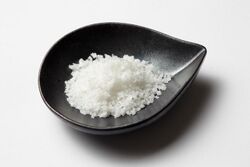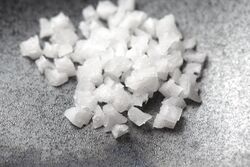Chemistry:Korean brining salt
From HandWiki
Short description: Coarse salt
Korean brining salt, also called Korean sea salt, is a variety of edible salt with a larger grain size compared to common kitchen salt.[1][2] It is called gulgeun-sogeum (굵은소금; "coarse salt") or wang-sogeum (왕소금; "king/queen salt") in Korean.[3][4][5] The salt is used mainly for salting napa cabbages when making kimchi. Because it is minimally processed, there are microorganisms present in the salt, which serve to help develop flavours in fermented foods.[1]
References
- ↑ 1.0 1.1 Parks, Cara (16 December 2014). "Shaking Up Salt" (in en). Modern Farmer. Archived from the original on 10 January 2017. https://web.archive.org/web/20170110161546/http://modernfarmer.com/2014/12/shaking-salt/.
- ↑ Kierzek, Kristine M. (11 March 2016). "Cooking up a cultural connection with Kimchi". Milwaukee Journal Sentinel. Archived from the original on 10 January 2017. https://web.archive.org/web/20170110163452/http://archive.jsonline.com/features/food/cooking-up-a-cultural-connection-with-kimchi-b99676674z1-371449931.html.
- ↑ "wang-sogeum". National Institute of Korean Language. Archived from the original on 10 January 2017. https://web.archive.org/web/20170110161828/http://krdict.korean.go.kr/eng/dicSearch/SearchView?nation=eng&ParaWordNo=68287.
- ↑ "wang-sogeum" (in ko). National Institute of Korean Language. Archived from the original on 10 January 2017. https://web.archive.org/web/20170110161826/http://stdweb2.korean.go.kr/search/View.jsp?idx=244395.
- ↑ "gulgeun-sogeum" (in ko). National Institute of Korean Language. Archived from the original on 10 January 2017. https://web.archive.org/web/20170110161828/http://stdweb2.korean.go.kr/search/View.jsp?idx=41865.
 |



